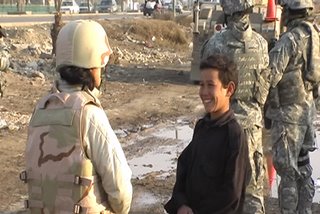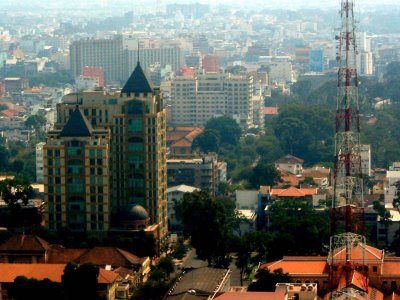While the majority of my postings were basically just day-journals describing where I went and who I met, etc. I wanted to do a post-trip report detailing some of the things that I learned or discovered and thought were interesting, at least to me.
India:
India's greatest export is human talent and they know it. Everyday I read the newspaper and managed to read the occasional local English language news magazine. They were chock-full of advertisements for private universities, colleges, and technical schools offering degrees in Medicine, Engineering, Computer Programming and Science, Advanced Chemistry, Physics, or Biology, Nursing, etc. The advertisements openly stated that their goal and purpose was to prepare their students for overseas positions in the U.S., Europe, and other developed nations, some even made dubious claims that guaranteed their students placement with a multinational firm. Despite India's "developing" status it is still an incredibly poor country with huge income disparity, massive poverty, barely functioning infrastrucure, mass pollution, and a rocky democracy. Anyone with enough education or money to immigrate has done so or is trying to do so. The few wealthy I met who were content to stay were those that owned factories and business and often had government or influential family connections. They lived in considerable luxury, driving Mercedes and BMWs, servants to take care of their every need, and took vacations all over the world, so they had little desire or need to move anywhere else. From what little I could gather, it was the middle class or somewhat upper middle class that was yearning for a new home elsewhere.
My agent had tried unsuccessfully to immigrate to the U.S., Germany, and France. He still had aspirations to move his family to another country, despite being fairly well off with what would be considered a very good job in India. A short time before I arrived he had gone to a farewell party for one of his close friends who had finally managed to find a way to immigrate to, if I remember correctly, Australia - after numerous attempts to European countries and the U.S. over a very long multi-year period. He had another friend who had spent a small fortune obtaining an engineering degree and several years of experience in a big Indian firm just so he would be considered for engineering positions overseas. After many months of searching, he finally got picked up by a firm in California willing to sponsor him for a work visa.
Bottom line, Indians are very well aware that the industrialized western world is short of skilled scientists, doctors, and technical workers such as engineers. There is a huge market for educating and developing skilled workers to supply developed countries and there is plenty of interest from the public.
The difference in our education emphasis was profound. Talk to most Indian parents and they will tell you their children are studying science, math, technology, finance, etc. Same goes for the students, who invariably end up studying whatever their parents want them to. While there are liberal arts colleges and classes, it seemed to me they were in the minority. When I told them that in the U.S. our students, for the most part, studied what they wanted to despite their parents' expectations, they were horrified that a child would even consider not fulfilling their parents' wishes. Keep in mind that this is a culture where some marriages are still arranged.
As can be imagined, many Indians are vegetarians, but what may be surprising to some is the militancy to which some Indians take it. For example, in Delhi some landowners refuse to rent to non-vegetarians. They will ask potential tenants if they eat meat or not - if the answer is meat, then they refuse to rent to them. This is obviously discriminatory and would never fly in the U.S., probably they even have an anti-discrimination law, but nobody follows it. In fact, that is a common feature of third world and developing countries: a lack of respect for the law and little enforcement of it. Many people just ignore the laws in place because they know there is little to no consequence for not following the law.
Another example of this is the concept of multiple wives, which from my understanding is forbidden by largely ignored laws. It is seen as a sign of affluency to have more than one wife. Of course, you can only be legally married to one wife, but often men will take a second or third "wife", just not legally marry them. Sometimes they all live happily together, sometimes the men will have several homes with a wife in each. Most of the time the first wives were fully aware of the situation and some were quoted as saying they had no problem with it - as long as their husbands took care of the family and the finances, then they were fine. However, I did read one story where they finally busted a guy after one of his newer wives complained - seemed he travelled a lot and was in the habit of marrying a girl in just about every province he visited. He even had homes and kids with these "wives" and somehow managed to keep it all in order without any of this wives realizing he had other families. He even used false identities in some cases to secure marriages. Eventually he was found out and they sorted through the guy's messy life. In most cases the men simply ignored or flaunted the law.
While many in the cities are well educated and live modern lifestyles, one only has to travel a short way outside the city limits to find dirt poor Indians living in the stone age. What middle class exists is thin, with most of society divided between urban and poor - you either live in a city in the modern world or eek out an existence in the rural country. As I stated in one of my India posts, it was not uncommon to see a shining gigantic mall and right across the street are farmers living in tin huts raising chickens and scratching out a living in the dirt. Often both sides were living smack dab next to each other.
The communist party has always enjoyed a fairly strong presence in Indian politics and from what I read it seemed they had taken good advantage of these "class" differences to bolster their numbers. I was alarmed to find that in one province the communists had won a large majority and was considered a major victory. Photos showed huge crowds of supporters in red shirts. My colleague could see I was surprised and told me not to worry, that the communists were a minority and not so bad. Yet one of the party organizers had named himself Stalin - legally changed his name to Stalin! - and it is an open secret that there is a growing Maoist insurgency wreaking havoc in different parts of India.
All the Indians I met were incredibly friendly, gracious, and polite. While certainly part of that is due to being on a business trip where I was the client, Indians are simply gracious hosts and value hospitality. They are also very proud of their history and culture, it only takes a few prodding questions about this or that landmark or building and they will eagerly provide you with a detailed history about it. Everywhere I went my Indian colleagues were eager to find out if I liked the food or pushed me to try something different. They went out of their way to ask if I was happy with the hotels or had any problems and seemed especially pleased when I complimented them about their offices or operations.
While we mostly avoided politics, the Indians I met seemed to genuinely like America and Americans, although many also expressed disappointment in our alliance with Pakistan, their old enemy. India has long been a victim of terrorism from a myriad group of enemies, long before the U.S., and those I spoke to expressed their strong opposition to any and all terrorist attacks and sympathized greatly with the U.S. during and after 9/11. Those I spoke to were avid supporters of the war on terrorism; some thought we weren't doing enough to kill terrorists and wondered why we showed so much restraint, and one gentleman even suggested we changed the wrong regime - he said we should have taken over Pakistan instead of Iraq.
While I thoroughly enjoyed all the wonderful people I met and found Indians to be incredibly friendly and gracious wherever I went, I can't say that it is a country I am looking forward to visiting again soon. I loved the food and have definitely made at least one good friend, but the entire country is basically broken - nothing really works. Sure, they have beautiful 5 star hotels with every amenity and modern air conditioned tour buses and cars that will take you to every major attraction you wish to see, but step outside that false comfort zone and you will find that all is not as it seems to be. Infrastructure is old and dated and unable to keep up with the pace of growth. If it weren't for the numerous generators installed at hotels and factories and major office buildings the electricity would be going out intermittently throughout the day. Litter was everywhere and in some cases piles of trash were found in the middle of fields or just on the side of the street. The pollution is almost unbearable and traffic is insane. Of course, it didn't help that I got horribly sick while I was there, that will put a damper on anyone's trip, but even when healthy I just saw a country trying to catch up with the industrialized world. Surely, they are making progress, and with such intelligent and hard working people I believe they will get there and become an economic powerhouse in the years to come. But that day is years away.
Next: Bali post-trip comments.







